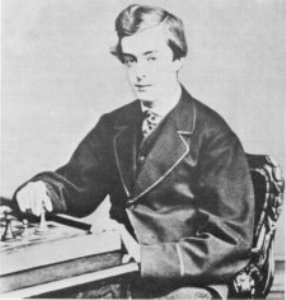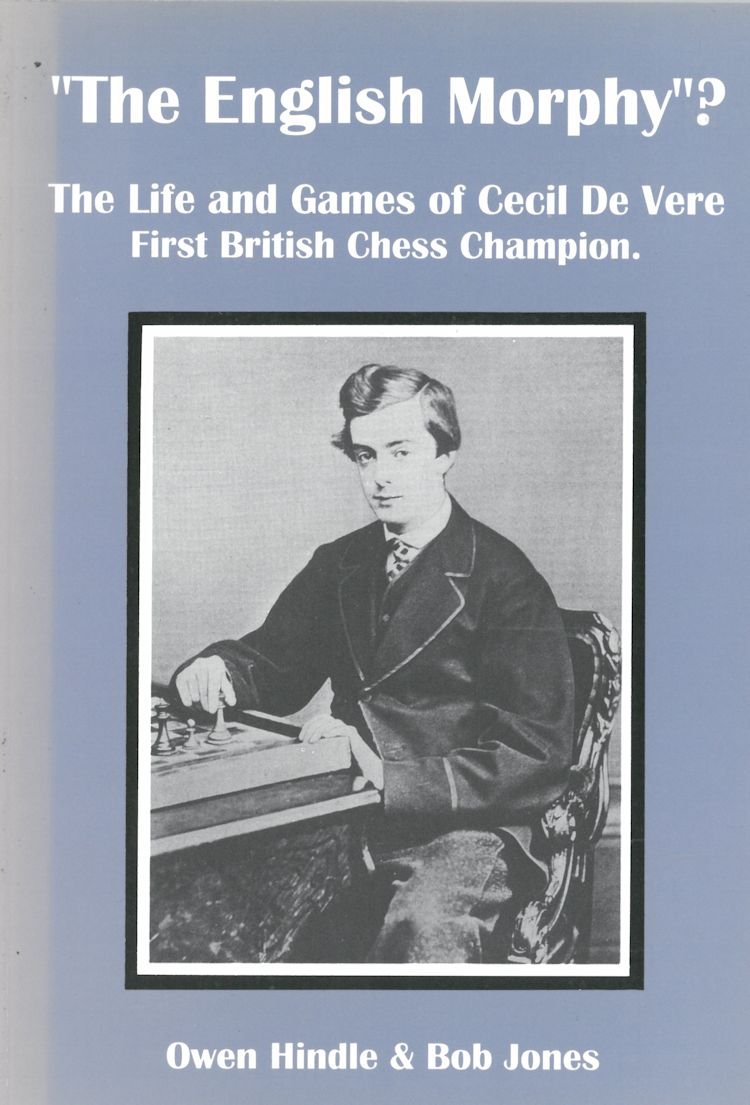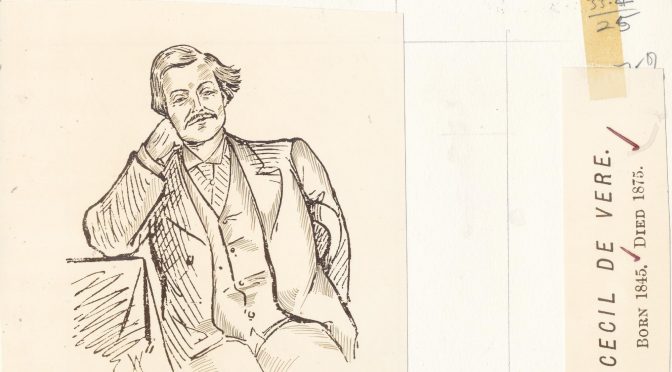We remember Cecil Valentine De Vere (14-ii-1846 09-ii-1875)
From British Chess Magazine, Volume CXXVI (125, 2005), Number 11 (November), page 610:
In Quote and Query #5741 Chris Ravilious wrote:
“When writing their “The English Morphy? The Life and Games of Cecil De Vere (2001)” Owen Hindle and Bob Jones faced some intractable difficulties. Where and in what year was De Vere born? What was his baptismal name? What could be established regarding his parentage and early life? On several of these topics they achieved significant progress but lacunae remained. The absence of a birth certificate was a particular cause for regret.
Owen’s researchers into De Vere’s background have continued and he has now made two further discoveries, the first being the 1861 census entry for 10 Lower Calthorpe Street, St Pancras. This lists Katherine De Vere (Cecil’s mother, aged 36 and born in Wales: her forename was previously uncertain), a 15-year old ‘C.V. De Vere’, a house servant and a lodger. Cecil, employed as a clerk to a West India merchant, is stated to have been born in ‘St Georges’, Middlesex, presumably the parish of St George’s adjacent to Hyde Park.
Owen’s second breakthrough came with the discovery of the elusive birth certificate. From this we learnt Valentine John Cecil De Vere was born on St. Valentine’s Day 1846 (not 1845 as some sources have suggested), at 46 Warwick Street, just to the east of Regent Street. (While not in St George’s Parish, Warwick Street is near enough for the divergence between this and the census return to be readily explicable) Valentine’s mother’s name is entered as Catherine Matthews and by a clerical slip-up the same appellation appears under ‘name of father’, where it has been crossed through and replaced by a mysterious ‘No. 12’ plus the registrars initials. ‘Occupation of father’ is entered as ‘surgeon’.
From British Chess Magazine, Volume LXXXIII (83, 1963), Number 5 (May), page 156:
In Quote and Query #1241 DJ Morgan wrote:
“Cecil de Vere, whose game was given by colleague Mr. Coles on p.83 of the March issue was one of the tragic figures of British Chess. Details of his short life are found in various writings of the Rev. G. A. MacDonnell and in the pages of The City of London Chess Magazine. We quote from P.W. Sergeant. He was born on February 14th, 1845, and his early natural ability for chess was developed by Francis Burden. In 1860 he began to visit the Divan on Saturday afternoons. By 1862 he was too strong for Anderssen at the odds of knight. In January, 1865, The Chess Player’s Magazine reports his having recently won the majority of a series of games with MacDonnell on level terms. Soon after, receiving pawn and move he defeated Steinitz by 7-3, with either 3 or 4 draws. He was indeed, the brightest prospect in British chess. But tragedy set in. By the Dundee Congress of 1867 he was in the grip of consumption. On top of this he came into a legacy, gave up a post he had with Lloyd’s, and set out on a life of dissipation. In 1872 he took over the chess editorship of The Field from Boden, and held it for tow years. But his constitution was undermined. A kindly amateur named J. Clark headed a subscription to send him to Torquay, It was too late. He died on February 9th, 1875, five days short of his thirtieth birthday.”
From The Oxford Companion to Chess by Hooper & Whyld:
Cecil Valentine De Vere, pseudonym of Valentine Brown, winner of the first official British Championship tournament organized by the British Chess Association in 1866. He learned the game in London before 1858 and practised with Boden and the Irish player Francis Burden (1830-82). De Vere played with unusual ease and rapidity, never bothering to study the books. His features were handsome (an Adonis says MacDonnell), his manner pleasant, his conduct polite. He “handled the pieces gracefully, never “hovered” over them, nor fiercely stamped them down upon the board … nor exulted when he gained a victory…in short, he was a highly chivalrous player.’ So wrote Steinitz who conceded odds in a match against De Vere and was soundly beaten, (See pawn and move.) De Vere’s charm brought him many friends.
At about the time that he won the national championship his mother died, a loss he felt deeply, “The only person who ever cared for me”.
Receiving a small legacy he gave up his job. which Burden had obtained for him at Lloyds the underwriters, and never took another. He entered some strong tournaments but always trailed just behind the greatest half-dozen players of his time. His exceptional talent was accompanied by idleness and lack of enthusiasm for a hard task. On the occasion of the Dundee tournament of 1867 he took long walks in the Scottish countryside with G. A. MacDonnell, who writes that a ‘black cloud’ descended on De Vere. It may have been the discovery that he had tuberculosis; more probably he revealed to the older man a deep-rooted despair, the cause perhaps of his later addiction to alcohol.
In 1872 Boden handed over the chess column of The Field to provide him with a small income; but in 1873 the column was given to Steinitz on account of De Vere’s indolence and drunkenness. At the end of Nov, 1874 his illness took a turn for the worse, he could hardly walk and ate little. His friends paid to send him to Torquay for the sea air, and there he died ten weeks later. He had failed to nourish a natural genius in respect of which, according to Steinitz, De Vere was “second to no man, living or dead*.

From The Encyclopedia of Chess by Anne Sunnucks:
First official British Chess Champion, Cecil de Vere was born on 14th February 1845 (in Montrose, Angus, Scotland : Ed.) and was taught to play chess when he was 12 by a strong London player, Francis Burden. By the time he was 15, he was a regular visitor to “The Divan” on a Saturday afternoon.
At the age of 19 De Vere played a number of games against MacDonnell winning the majority of them. So great was his promise that the City of London Chess Club raised a purse for a match between him an Steinitz, Steinitz giving the odds of a Pawn and a move. De Vere won.
In 1866 the first British Championship, organised by the British Chess Association was held. De Vere won, ahead of MacDonnell and Bird, and so became the first British Champion at the age of 21.
The following year in the Paris 1867 tournament, he was 5th out of a field of 13, and he tied for 3rd prize in the Dundee Congress, ahead of Blackburne, having beaten Steinitz in their individual game.
While he was in Dundee, De Vere learned that he was suffering from Tuberculosis. The news changed his whole life. Having recently inherited a few hundred pounds, he gave up his job at Lloyd’s and started living on his capital, determined to enjoy the few years he had left. He continued to play chess, but his performances were marred by his newly acquired addiction to the bottle.
De Vere was once described as “A Morphy without book knowledge”. His talent was great enough for him to be able to take on the leading masters of the day without any study or preparation, but more than that is needed to reach the top. De Vere lacked the strength of character and health to fulfil his early promise. He died a few days before his thirtieth birthday.
From The Encyclopedia of Chess by Harry Golombek:
The first official British Champion and a player of great promise who might well have attained world fame had he not be carried off by that nineteenth-century British scourge, tuberculosis, before he attained the age of thirty.
Most of the details of his life are to be found in the writings of G.A. MacDonnell, who met him when De Vere was fourteen and was so struck by his good looks as to refer to him as “Adonis”.
His first tournament success came in 1866 at the London Congress organised at the St. George’s Club in the first few days and then in other venues by the British Chess Association. De Vere played in two events, a Handicap tournament and a Challenge Cup event which was in fact the first British Championship tournament.
The Handicap tournament was run on the same lines as London 1851, i.e. it was a knock-out event with matches of three games, draws not counting. De Vere met Steinitz in round 1 and lost by 2-1.
The first British championship tournament was an all-play-all event in which the ties were decided by the first player to win three games and in which the championship went to the winner of the biggest number of games. De Vere was an easy winner with 12 wins, followed by MacDonnell and J.I. Minchin 6, H.E Bird 3 and Sir John Trelawney 0.
Thus De Vere was the first British Champion and at that age of twenty-one. A photograph of him about this time shows that he bore a remarkable likeness to the international master John Nunn, who won the European Junior championship a hundred years after De Vere’s death.
De Vere confirmed his position as a leading British player by coming first in another tournament in 1866 at Redcar in North Yorkshire. This was an event open to all British amateurs and among his opponents were Owen, Thorold and Wisker.
It was in the following year that he commenced his career in international chess. In the important double-round tournament at Paris he occupied an honourable fifth place out of 13 players. At Dundee (the third congress of the British Chess Association) he finished equal 3rd with MacDonnell, below Steinitz but beating him in their individual game and coming ahead of Blackburne.
It was during his visit to Scotland (he went to stay with relatives after the tournament) that he learnt he was afflicted with consumption. This knowledge, together with the death of his mother, drove him to drink which was to accelerate his end.
inheriting a few hundred pounds, presumably from his mother, he gave up his post at Lloyd’s and decided to live on his capital together with such additional sums as he could earn from chess.
In this respect his addiction to drink proved a handicap. For example, he held the post of chess editor of The Field in 1872 but lost it after some eighteen months through inattention to work.
Meanwhile he continued to show his great talent for the game. Defending the title of British Champion in a very strong field at the next British Chess Association congress (1868/9) he cam equal first with Blackburne but lost the play-off at the London Club in March 1869.
In 1870 at the very strong Baden-Baden double-round tournament, he came equal sixth with Winawer but was much outdistanced by Blackburne who came third with 3.5 more points than De Vere. But already his illness was taking a strong hold on him. At his next and last appearance in a tournament of note. London 1872, he tied with Zukertort and MacDonnell =3rd out of 8 players. In the play-off for third and fourth prizes he lost to MacDonnell and scratched to Zukertort, Later in the year he did tie for first place with Wisker in a weaker British championship tournament and, with De Vere now clearly ill, Wisker had an easy victory in the play-off.
At his last appearance at a chess event, a match at the City of London Club between that Club and Bermondsey, he looked a dying man. A subscription was made to send him to Torquay but it was too late and he died within five days of his thirtieth birthday.
Here are some of his games at chessgames.com
The English Chess Forum contains a brief discussion initiated by John Townsend (Wokingham) of manuscripts attributed to CdV.
Here is his Wikipedia entry


